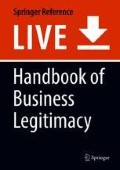Abstract
For decades, corporations, consultants, and academics have examined different ways of incentivizing employees to align their volition with the interests of the corporation. This so-called soft Human resource management (HRM) adjusts working environments to the emotional needs of their employees. Critical voices have accompanied the attempts, blaming corporations for manipulating the very souls of their employees into identifying with the interests of the managerial elite without rewarding their dedication.
One of the latest management fads, gamification, has been met with similar criticism. With reference to a more detailed account of gamification and arguments from one of its critics, this chapter will show that the criticism is based on a perception of the relation between management and employees that questions the fundamental moral legitimacy of business and, as such, shows that the criticism is therefore of a circular nature. When academics presume that the overall system is deprived of legitimacy, then it only has to be demonstrated that the given HRM initiative is coherent with the values of that system in order to argue that the given HRM initiative is also deprived of legitimacy.
This circularity provides academics with a cornucopia of opportunities to criticize corporations. This chapter wishes to encourage academics, who reject neoliberal capitalism in its totality, not to waste their time also rejecting its individual manifestations but instead either apply a more differentiated approach that might assist managers and employees in cooperating across hierarchical differences or to dedicate their efforts to developing alternative social and political models.
References
Bogost I (2014) Why gamification is bullshit. In: Walz SP, Deterding S (eds) The gameful world, approaches, issues and applications. The MIT Press, Cambridge, MA
Chou Y (2014) Applicable gamification. Octalysis Media, San Francisco
Cook W (2013) Five reasons you can’t ignore gamification, Chief Leaning Officer 2013. http://m.cedma-Europe.org/newsletter%20articles/Clomedia/Five%20reasons%20you%20Cannot%20Ignore%20Gamification%20(May%2013).pdf
Deterding S (2011) Gamification: using game design elements in non-gaming contexts. In: Conference: proceedings of the international conference on human factors in computing systems, CHI 2011, Extended abstracts volume, Vancouver, 7–12 May 2011
Ebner J (2017) The rage, the vicious circle of Islamist and far-right extremism. Bloombury, London
Eichengreen B (2007) The European economy since 1945, coordinated capitalism and beyond. Princeton University Press, Princeton
Fleisch H (2018) Gamification4Good, Gemeinwohl spielerisch stärken. Erich Schmidt Verlag, Berlin
Fleming P (2005) Workers’ playtime? Boundaries and cynicism in a “Culture of Fun” program. J Appl Behav Sci 41(3):285–303
Gill C (2007) A review of the critical perspective on human resource management. Selected works of Caroll Gill Melbourne University. https://works.bepress.com/carol_gill/11/
Huizinga J (1949/1980) Homo ludens, a study of the play element in culture. Redwood Burn, London
Kapp KM (2014) What L&D professionals need to know about gamification. Training Industry Magazine, 16–19. http://cedma-europe.org
Levine P 2009 Reforming humanities. Palgrave Macmillan, New York
Limelight Network (2019) The state of online gaming 2018. https://www.limelight.com/resources/white-paper/state-of-online-gaming-2018/#overview
McGonigal J (2003) ‘This is not a game’: immersive aesthetics and collective play. Melbourne DAC. https://janemcgonigal.files.wordpress.com/2010/12/mcgonigal-jane-this-is-not-a-game.pdf
McGonigal J (2011) Reality is broken, why games make us better and how they can change the world. Random House, London
Nelson MJ (2012) Soviet and American precursors to the gamification of work. In: Proceedings of the International Academic MindTrek conference, New York, pp 23–26
Orendain P (2014) Training & engagement on the front line: the delta air lines way. Speech given at the G-Summit 2014. https://www.youtube.com/watch?v=IHou9ICwL1E
Perlow LA (1998) Boundary control: the social ordering of work and family time in a high-tech corporation. Adm Sci Q 43(2):328–357. Special issue: critical perspectives on organizational control (Jun, 1998)
Ray PJ (2014) Gamification and post-fordist capitalism. In: Walz SP, Deterding S (eds) The gameful world, approaches, issues and applications. The MIT Press, Cambridge, MA
Salamon KLG (2003) Prophets of a cultural capitalism, an ethnography of romantic spiritualism in business management. Folk J Danish Ethnographic Soc 44:89–115
Townley B (1993) Foucault, power/knowledge, and its relevance for human resource management. Acad Manag Rev 18(3):518–545
Walden et al (2018) ‘Profit and Loss-of-One’, Preventing fraud, enhancing compliance using digital twins. Fraud Magazine, January February 2018
Whitson JR (2014) Foucault’s fibit: governance and gamification. In: Walz SP, Deterding S (eds) The gameful world, approaches, issues and applications. The MIT Press, Cambridge, MA
Wilmott H (1993) Strength is ignorance; slavery is freedom: managing culture in modern organizations. J Manag Stud 30(4):515–553
Woodcock J, Johnson MR (2018) Gamification: what it is, and how to fight it. Sociol Rev 66(3):542–558
Author information
Authors and Affiliations
Corresponding author
Editor information
Editors and Affiliations
Rights and permissions
Copyright information
© 2020 Springer Nature Switzerland AG
About this entry
Cite this entry
Thejls Ziegler, M. (2020). Motivating Employees in a Globalized Economy: The Moral Legitimacy of Applying Gamification in a Corporate Context. In: Rendtorff, J. (eds) Handbook of Business Legitimacy. Springer, Cham. https://doi.org/10.1007/978-3-319-68845-9_109-1
Download citation
DOI: https://doi.org/10.1007/978-3-319-68845-9_109-1
Received:
Accepted:
Published:
Publisher Name: Springer, Cham
Print ISBN: 978-3-319-68845-9
Online ISBN: 978-3-319-68845-9
eBook Packages: Springer Reference Religion and PhilosophyReference Module Humanities and Social SciencesReference Module Humanities

